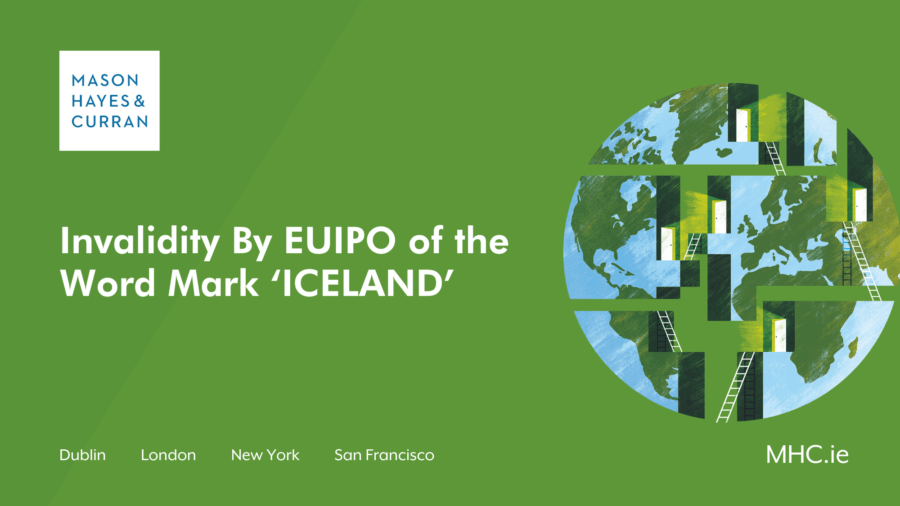
We look at the decision concerning the word mark of the Grand Board of the European Union Intellectual Property Office (EUIPO) (the Board) which upheld the previous decisions of EUIPO’s Cancellation Division invalidating ICELAND word and figurative marks. The decisions issued on 15 December 2022, separately, following protracted invalidity proceedings between the UK supermarket chain Iceland (Iceland the Supermarket Chain) and Iceland the country (the Applicant).
Iceland: the word mark decision
The Board’s decision focused on the geographically descriptive element of Article 7(1)(c) EUTMR. In other words, trade marks which consist exclusively of signs or indications which may serve to designate the geographical origin of the goods or service must not be registered. Having regard to the public interest aim of Article 7(1)(c), the Board noted that signs should remain freely available to all organisations when describing the same characteristics of their own goods.
Following the criteria established in the Windsurfing Chiemsee case, the Board carried out an analysis of the descriptive character of the sign ICELAND. It found that the description of the country of the same name would be understood by the relevant public in Ireland, the UK plus Scandinavian countries where the relevant public have a sufficient command of English. Based on its high profile, the Board also found that the degree of familiarity of the relevant public with the geographical name of Iceland is very high: “Over the course of time, the target public has been inculcated through a combination of education, travel, food and agriculture products (such as wild-caught and farmed fish, lamb and dairy products, in particular skyr), media exposure and general life experience to make an association between the geographic name Iceland and the country of the same name.”
Dismissing Iceland the Supermarket Chain’s argument that volcanic eruptions and a banking crisis created negative associations with Iceland, the Board held that the country Iceland invoked positive associations of sustainability which were liable to add value to its industries that export goods and services.
Confirming the criterion in Windsurfing Chiemsee the Board held that “it only needs to be established that the geographical term is – or may be in the future – associated with the goods and services of the contested mark.” The Board carried out an extensive analysis of the goods and services of the contested mark. The Board found that it was reasonable to consider ICELAND could be descriptive of the contested goods and services, namely food, beverages, agricultural products, household appliances and apparatus, paper products and retail services. This is a very wide range of goods and services, from the perspective of the relevant public.
Interestingly, the Board was critical of the fact that the survey of the evidence submitted by Iceland the Supermarket Chain to support its arguments that Iceland is not associated in consumers' minds in certain Member States with the goods in question, was neither concurrent to the filing date nor included data from Denmark. Data from Denmark would be particularly significant given the close historic bond, Denmark historically ruled Iceland for 400 years, and geographic link between the two countries.
The Board concluded by remarking that the relevant EU public are more familiar with the name of countries of the EU member states and the EEA. As a result, the relevant public are more likely to deem these neighbouring countries as having favourable characteristics which may in turn influence their buying behaviour. It differentiated the current dispute from the Alaska judgment citing the distance, lack of familiarity by EU citizens and lack of Alaska’s reputation for eco-friendliness as some of the reasons that the cases were not comparable.
The evidence submitted, illustrating a close relationship between Iceland, the EU and Denmark plus the positive image as a tourist destination and as a nation brand, clearly played a central role in influencing the Board.
Comment – Doing it Wrong
Considering the conduct of Iceland the Supermarket Chain to date, and the investment in its branding, it seems inevitable that Iceland the Supermarket Chain will seek to appeal the Board’s decision. When you go back to the basics of intellectual property law this is not a controversial decision. As the Board noted “placing the monopolisation of the sign into the hands of one undertaking would have prejudicial consequences on competition, which would ultimately not be in the interests of consumers.” Icelandic indigenous industries should not be prevented from using the term Iceland in the products they sell. It is hard to conceive that a higher authority would reach a different conclusion.
An extract from the book “Doing it Right” submitted as evidence in the initial application by Iceland the Supermarket Chain explains the decision to use the sign ICELAND for the supermarket. The name was based on the fact that the business sold ‘frozen foods’ and there was a play on ‘land’ (place) and ‘ice’ (frozen). However, it seems to us that this may be a case of Doing it Wrong.
For expert advice on successfully protecting your organisation's IP rights, contact a member of our Intellectual Property team.
The content of this article is provided for information purposes only and does not constitute legal or other advice.




